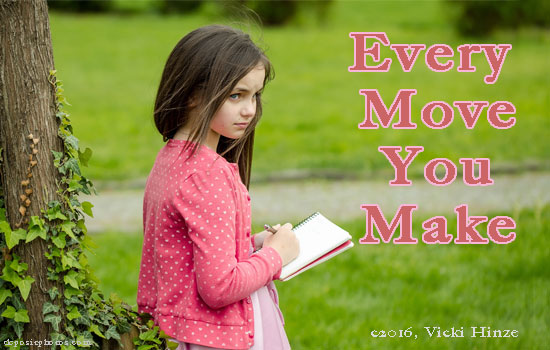Every Move You Make
By
Vicki Hinze
In a free and civil society, people can hold any opinion they choose, voice it or not, and agree to disagree with others. At least, those have been the hallmarks of acceptable public behavior for a long, long time.
Things seem to be changing. Speak out, and those who disagree with you don’t simply exercise their right to disagree, they feel perfectly all right with shutting you down or seeking to destroy you. Some stoop to physical assault and violent, threatening tactics that are anything but civil.
If and when we choose to tolerate that type of conduct, whether fostered or not by others, the blame for our own behavior is on us. As the saying goes, If you condone it, you own it.
But there is another aspect to this acceptable and unacceptable behavior that we hear too little about, and the consequences of it are huge. It is that aspect which is of concern to us all. It is:
When in public, we are all teachers, mentors, and students.
Whether we are directly involved in an event or situation or we are merely observers, we act and react to our circumstances and the situations in which we find ourselves. How we react as a participant or observer teaches the young among us how they are to react. Whether or not we intend to be, we are the role model. The example. We are the peer.
When we react with hostility, we’re teaching the young to be hostile. That hostility is normal and acceptable. When we are angry, we teach the young to be angry and how to express it publicly and/or privately. Our upset is witnessed. Our actions and/or inactions are witnessed and processed and, for better or worse, they become guideposts for others on what appropriate responses look like in our society.
For years, the experts have warned us: Children Learn What They Live. We know it. We accept it, and for the most part we do not dispute it. What we might not have heard is that young adults and new adults also learn what they live. Direct involvement has a more powerful impact, but what these individuals observe in others—older and wiser, the mentors among them—is too often neglected by those who are purportedly older and wiser.
And that’s the point. As adults, it is our responsibility to restrain ourselves, to exercise discipline, and to respect the rights of others to voice their opinions. It is our responsibility to ourselves and to society as a whole to do so judiciously.
People talk about rights a lot. Freedom of speech, expression and choice. And those rights are precious ones, cherished by us. The part that often gets forgotten is that with rights come responsibilities, and in exercising a right we are not authorized to infringe on another’s rights. That’s the part the children we mentor deliberately or incidentally notice. And the behavior they view as appropriate.
Which means it is the obligation of every adult to be civil and aware of his or her own status as a role model and example. Leadership isn’t exclusive to people in public positions. It also includes the positions of people in public.
So whether you’re crafting characters in a novel or a life, be aware that your actions, reactions and public conduct doesn’t just affect you. It affects others, too. Your conduct is the virtual lighthouse guiding others, whether you know them or not. Whether you want to be their role model or not.
Kids watch every move you make. Hear every word you say, and how you say it. They take in every action you take. And every reaction to those actions. Let them observe in you something worthy and good. Something of value. Let your words and actions and reactions be inspiring to them. Something of benefit to society as a whole that they can reflect in their words, actions and reactions. What you say and do, and how you say and do it is exactly what you are teaching them.
At the core, by the way you handle yourself, you choose whether to be a positive influence or a negative influence on the young around you. Because they are looking to you for instruction and guidance. And they are watching every move you make.






